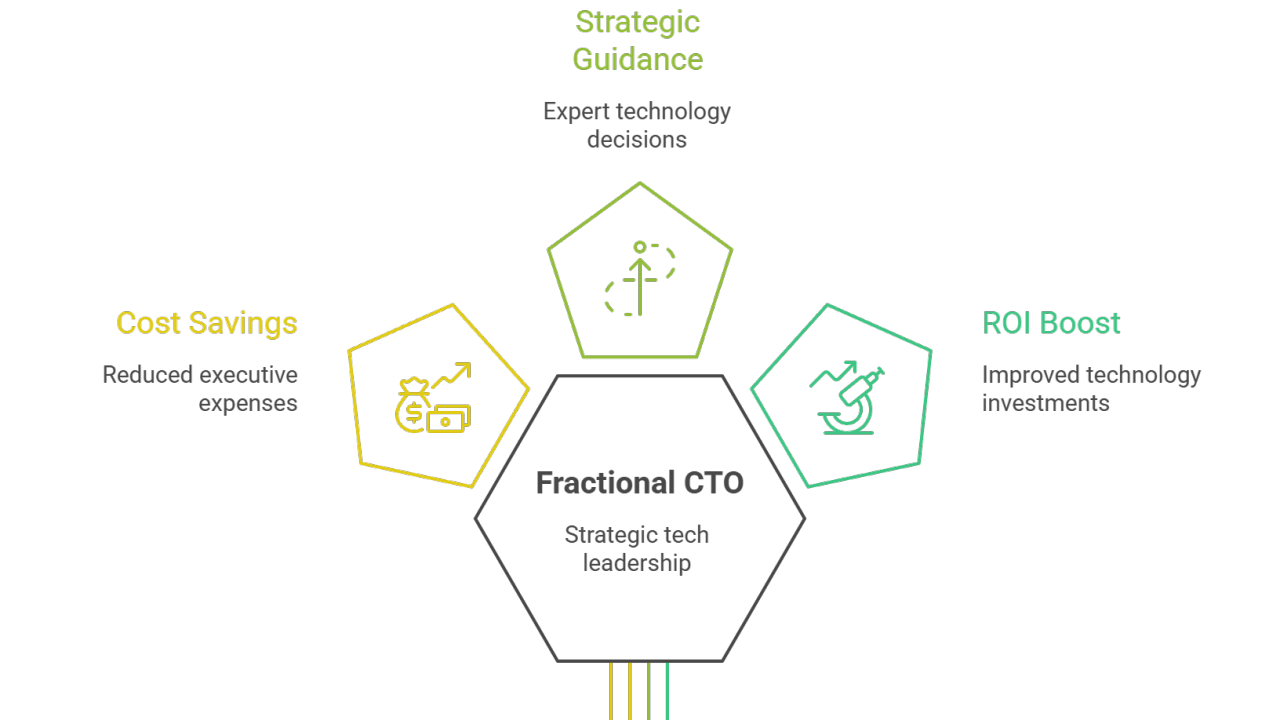Why SMBs Choose Fractional CTOs Over Full-Time Hires
Are you flying blind on technology?
It’s a terrifying question for most SMB owners and tech entrepreneurs. You know technology is the engine of your growth, but you’re also facing a critical gap. You’re making decisions on cloud infrastructure, cybersecurity, and AI integration based on guesswork, not strategy. You’re accumulating tech debt that you know will cripple you later.
The problem isn’t intelligence; it’s bandwidth and budget.
You know the solution: a Chief Technology Officer (CTO). But then you see the numbers. In 2025, the average total compensation for a full-time CTO in the U.S. can easily surpass $400,000 when you factor in salary, 30%+ in benefits, bonuses, and recruiting fees. For a startup, you also have to give up 1-4% in precious equity.
For 90% of SMBs, this is a non-starter. So, they compromise—burdening a Head of Engineering with strategy they aren’t trained for, or worse, having a non-technical founder make critical architecture decisions.
But what if you could get the 20% of a CTO’s time that drives 80% of the value? What if you could access elite, C-suite strategy for the cost of a mid-level manager?
This is why the Fractional CTO model has exploded. It’s not just a cost-saving hack; it’s a strategic weapon for SMBs. This article breaks down exactly why this model works, who it’s for, and how it delivers a massive ROI.
The Problem: The Unaffordable—And Unavoidable—Cost of Tech Leadership
For a small or medium-sized business, the cost of a full-time C-suite executive is staggering. Let’s break down the real cost of a full-time CTO, based on 2024 and 2025 market data.
- Average Base Salary: $220,000 – $280,000+ (Source: Built In)
- Benefits (Health, 401k, etc.): ~30% of salary ($66,000 – $84,000)
- Bonuses & Stock Options: $50,000 – $150,000+
- Recruiting & Onboarding: 20-30% of first-year salary ($44,000 – $84,000)
- Equity (for Startups): 0.8% – 4.0% of the company (a potential multi-million dollar cost)
Total First-Year Cash Cost: $380,000 – $600,000+
This cost is simply not feasible for a business with $5M, $10M, or even $30M in annual revenue.
But the cost of not having this leadership is just as deadly, only slower. It shows up as:
- Weak Cybersecurity: Making you a prime target for ransomware.
- Crippling Tech Debt: Rushing features on a poor foundation that will require a million-dollar rewrite later.
- Poor Vendor Choices: Getting locked into a 3-year contract for the wrong CRM or cloud provider.
- Missed Opportunities: Failing to leverage AI or automation while competitors do.
- Team Misalignment: Your engineering team builds in a silo, disconnected from the company’s real business goals.
This is the exact gap the Fractional CTO is designed to fill.
What is a Fractional CTO (And Why Are They Trending)?
A Fractional CTO (or “part-time CTO”) is a highly experienced, C-suite technology executive who works with multiple companies at once. Instead of a full-time, 40-hour-per-week W-2 employee, you get a dedicated partner for 10, 15, or 20 hours a month on a flexible contract.
This isn’t just a consultant. A true Fractional CTO integrates into your leadership team. They join your weekly strategic meetings, mentor your engineering leads, own the technology roadmap, and are accountable for the outcomes.
This model is surging because it creates a perfect win-win:
- For SMBs: They get access to world-class talent and experience they could never afford full-time.
- For Executives: Top-tier CTOs are leaving the 60-hour-week grind. Gartner research shows C-suite burnout is at an all-time high. The fractional model allows them to do high-impact, strategic work they love, maintain flexibility, and advise a portfolio of interesting companies.
The market reflects this. The number of fractional leaders in the U.S. doubled from 60,000 in 2022 to 120,000 in 2024, according to a report from ColumnContent. This is the new standard for agile business.
5 Core Benefits of a Fractional CTO for SMBs
So, why is this model so compelling? It goes far beyond just saving money.
1. Drastic Cost Savings & Immediate ROI
This is the most obvious benefit. Instead of a $400k+ annual commitment, you get strategic leadership for a predictable monthly retainer.
Typical Fractional CTO engagements range from $3,000 to $10,000 per month, depending on the hours and scope.
Let’s compare the two models:

The Fractional CTO provides an immediate 70-90% cost savings on a fully-loaded basis. That saving drops directly to your bottom line or can be re-invested into hiring two more senior engineers, supercharging your product development.
2. Access to Elite, On-Demand Expertise
Most SMBs can’t afford a CTO who has scaled a company from $10M to $100M, managed a 50-person engineering team, or led a complex SOC 2 compliance audit.
But you can rent that experience.
A Fractional CTO has likely seen your exact problem 10 times before. They aren’t learning on your dime. You are hiring them for their deep experience and pattern recognition.
- They know which cloud provider to choose and how to negotiate the contract.
- They can design a scalable architecture that won’t break in 18 months.
- They can implement a real cybersecurity framework that protects you and your customers.
- They understand complex regulations like GDPR (for EU customers) or CCPA (for California).
You get the wisdom of a $500k-a-year executive, precisely when you need it.
3. Unmatched Flexibility and Scalability
Your technology leadership needs are not static.
- Seed Stage: You need 5 hours/month for high-level architecture review.
- Series A / Growth: You need 20 hours/month to build a tech roadmap, hire a team, and manage sprints.
- Major Project (e.g., Cloud Migration): You need 30 hours/month for 3 months.
- Stable/Mature: You need 10 hours/month to mentor your VP of Eng and manage the budget.
A Fractional CTO model allows you to scale your engagement up or down as your needs change. You aren’t locked into a full-time hire you may not fully need in six months. This agility is a massive competitive advantage.
4. An Objective, Unbiased Strategic View
A full-time employee is inherently political. They are worried about their career path, internal rivalries, and protecting their team.
A Fractional CTO has one job: to give you the best, most objective advice to move the business forward.
- They aren’t afraid to tell you your “pet project” is a waste of resources.
- They can objectively audit your engineering team’s performance.
- They aren’t tied to any specific vendor or technology; they recommend what’s right, not what’s familiar.
This unbiased, “outside-the-bottle” perspective is invaluable for making tough, correct decisions without the drama of internal politics.
5. Faster Time-to-Market and Risk Mitigation
How does a Fractional CTO help you move faster? By eliminating mistakes.
Every week an SMB spends on the wrong tech, debates an architecture, or lets tech debt pile up is a week a competitor gets ahead. A good fractional leader is a decision-making accelerant.
They mitigate risk by:
- Preventing Bad Hires: They know how to spot a “talker” vs. a “doer” and will run your technical interviews.
- Enforcing Best Practices: They implement source control, CI/CD pipelines, and testing frameworks that prevent bugs and downtime.
- Focusing on Security: They build security in from day one, not as an afterthought—preventing a catastrophic data breach.
When Does Hiring a Fractional CTO Make Sense?
This model is perfect for specific, high-stakes scenarios.
- Early-Stage Startups (Pre-Seed/Seed): You need a credible tech roadmap and architecture to pitch to investors, but you have no budget for a full-time co-founder.
- Growth-Stage SMBs ($5M – $50M): Your tech is a “black box” to you. You have a team of 5-20 engineers, but no senior leader to mentor them, set a strategy, or manage the budget.
- During a Major Tech Project: You’re migrating to the cloud, building a new mobile app, or implementing an ERP system. You need an expert to lead the project successfully.
- In a Tech Crisis: You just had a security breach, your main platform keeps crashing, or your best engineer just quit. You need an expert to triage the disaster now.
- Bridging a Leadership Gap: Your full-time CTO just left, and it will take you 6 months to find a replacement. An interim CTO (a type of fractional CTO) can step in to keep the ship running.
Common Mistakes a Fractional CTO Prevents
According to data from SCORE, some of the most common tech mistakes small businesses make are neglecting cybersecurity, using outdated software, and having no data recovery plan.
A Fractional CTO is your insurance policy against these critical errors.
- The “It Won’t Happen to Us” Security Flaw: A fractional leader will implement multi-factor authentication (MFA), vulnerability scanning, and employee training. They stop a breach before it happens.
- The “Just Ship It” Tech Debt Pile-up: They enforce code quality standards and balanced “feature work” with “bug-fixing/refactoring” to ensure your platform remains stable and scalable.
- The “Wrong Tool” Vendor Lock-in: They run a proper Request for Proposal (RFP) process to select a CRM, cloud provider, or other SaaS tool that actually fits your business for the next 5 years.
- The “No Plan” Disaster: They implement and test a real data backup and disaster recovery (DR) plan, ensuring that if your server fails, you’re back online in minutes, not days.
The Future of Tech Leadership: The C-Suite Gig Economy
The move toward Fractional CTOs isn’t just an SMB trend; it’s the future of executive work. As technology becomes more complex (AI, quantum, Web3), no single person can be an expert in everything.
The future model for many companies will be a “hybrid C-suite”:
- A full-time, hands-on VP of Engineering who manages the day-to-day.
- A Fractional CTO who handles high-level strategy, M&A, and budgeting.
- A Fractional CISO (Chief Information Security Officer) who dials in for 10 hours a quarter to run audits and compliance.
This “as-a-service” model (CTO as a Service) gives companies a “T-shaped” leadership team—deep in daily execution and broad in strategic expertise—while remaining agile and cost-effective.
Conclusion: Your Next Strategic Hire
For a growing SMB, you can no longer afford to guess on technology. But you don’t have to bankrupt yourself to get the leadership you need.
The Fractional CTO model has moved from a niche concept to an essential business strategy. It allows you to de-risk your business, accelerate your growth, and operate with the same level of technical expertise as your enterprise-level competitors.
Key Takeaways:
- A full-time CTO can cost $400,000+ per year with salary, benefits, and equity.
- A Fractional CTO provides C-suite leadership for a flexible retainer, often $3,000 – $10,000 per month.
- You get access to elite experience in scaling, security, and strategy that you couldn’t otherwise afford.
- This model is flexible, scaling with your needs and providing an objective, unbiased perspective.
- A fractional leader prevents critical mistakes in security, architecture, and hiring, delivering an immediate and massive ROI.
If your technology feels more like a liability than a competitive advantage, your next hire probably isn’t a full-time employee.
Ready to build a tech strategy that actually drives growth?
Schedule a free, no-obligation consultation with our team of expert Fractional CTOs today.





